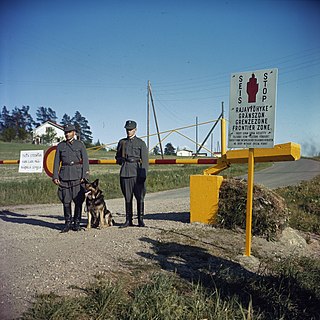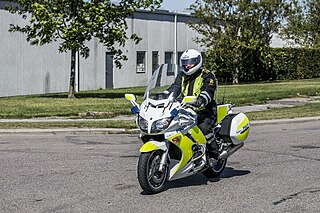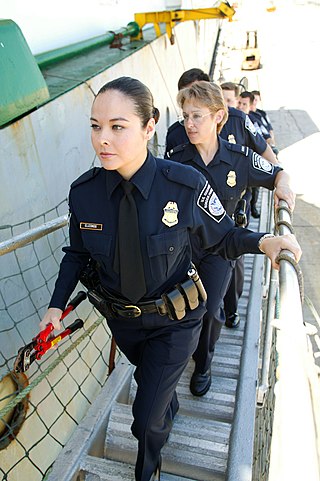
Law enforcement in Australia is one of the three major components of the country's justice system, along with courts and corrections. Law enforcement officers are employed by all three levels of government – federal, state/territory, and local.

Law enforcement in France is centralized at the national level. Recently, legislation has allowed local governments to hire their own police officers which are called the police municipale.

The Politiets Aktionsstyrke is the police tactical unit of the Danish National Police. It is meant to handle extraordinarily difficult or life-threatening criminal situations, such as terrorism, hostage situations, and kidnapping. It also deals with emergency rescue situations that would be too dangerous for others to handle. The AKS holds responsibility for all anti-terror and counter-terrorism missions in Denmark. It is known that AKS cross-trains with the army and navy elite-units Jægerkorpset and Frømandskorpset.
The Danish Security and Intelligence Service is the national security and intelligence agency of Denmark. The agency focuses solely on national security while foreign intelligence operations are handled by the Danish Defense Intelligence Service.

The Danish Defence Intelligence Service is a Danish intelligence agency, responsible for Denmark's foreign intelligence, as well as being the Danish military intelligence service. DDIS is an agency under the Ministry of Defence and works under the responsibility of the Minister of Defence. It is housed at Kastellet, Copenhagen.

A border guard of a country is a national security agency that ensures border security. Some of the national border guard agencies also perform coast guard and rescue service duties.
Law enforcement in Malaysia is performed by numerous law enforcement agencies and primarily the responsibility of the Royal Malaysia Police. Like many federal nations, the nature of the Constitution of Malaysia mandates law and order as a subject of a state, which means that local government bodies also have a role to play in law enforcement, therefore the bulk of the policing lies with the respective states and territories of Malaysia. Below are some of the law enforcement bodies and agencies of Malaysia.
Ministry of Justice of Denmark is the Danish government ministry responsible for the general judicial system, including the police and the prosecution service, the courts of law, and prisons and the probation service. In addition, the Ministry is responsible for legislation in the areas of criminal, private and family law, the law of trusts and foundations, nationality law and data protection law. The Ministry of Justice of Denmark might oversee the administration of justice in Greenland.
Law enforcement in Indonesia is mainly performed by the Indonesian National Police (POLRI), together with other law enforcement agencies which are under the president, a certain ministry or State-owned company (BUMN) which perform policing duties for a certain public service, these law enforcement agencies are under supervision and are trained by the Indonesian National Police. The Indonesian National Police is basically the national civilian police force of the country responsible for enforcing law and order of the state.

The National Police of Denmark is the upper most level of the police of Denmark within the Danish Realm. Administered by a framework of laws dictated by the Folketing and the government's Minister for Justice, Rigspolitiet polices all regions governed by Denmark, including the Faroe Islands and Greenland.
Law enforcement in Albania is the responsibility of several agencies. The responsibility for most tasks lies with the Albanian State Police, a national police agency, which is under the authority of Ministry of Internal Affairs. Examples of other agencies with limited policing powers are the Municipal Police, which has administrative functions and operates in the local level. They are controlled by mayors.
Danish Front was an extreme right, nationalist network in Denmark, whose goal was to "keep Denmark for the Danish people", thus they were also against multiculturalism and "alien religions" such as Islam.

In many countries, particularly those with a federal system of government, there may be several law enforcement agencies, police or police-like organizations, each serving different levels of government and enforcing different subsets of the applicable law.

The Police of Denmark is the Danish National Police force, and the interior part of the Danish security forces in the Kingdom. The police are empowered to enforce the law and to effect public and social order, as well as being responsible for border control.

The federal government of the United States empowers a wide range of federal law enforcement agencies to maintain law and public order related to matters affecting the country as a whole.

The Joint Arctic Command is a direct Level II authority in the Danish Defence. Joint Arctic Command's primary mission in peacetime is to ensure Danish sovereignty by monitoring the area around the Faroe Islands and Greenland. The command also handles tasks such as fisheries inspection, search and rescue (SAR), patient transport and other tasks that support the civil society. In short, the Joint Arctic Command handles military tasks, coast guard duties and disaster response - all in one organisation.

Lars Johan Findsen is a Danish jurist and former civil servant who served as chief of the Danish Defence Intelligence Service (DDIS) from 2015 to 2020 when he was relieved of duty due to concerns from the regulatory body of the DDIS.












